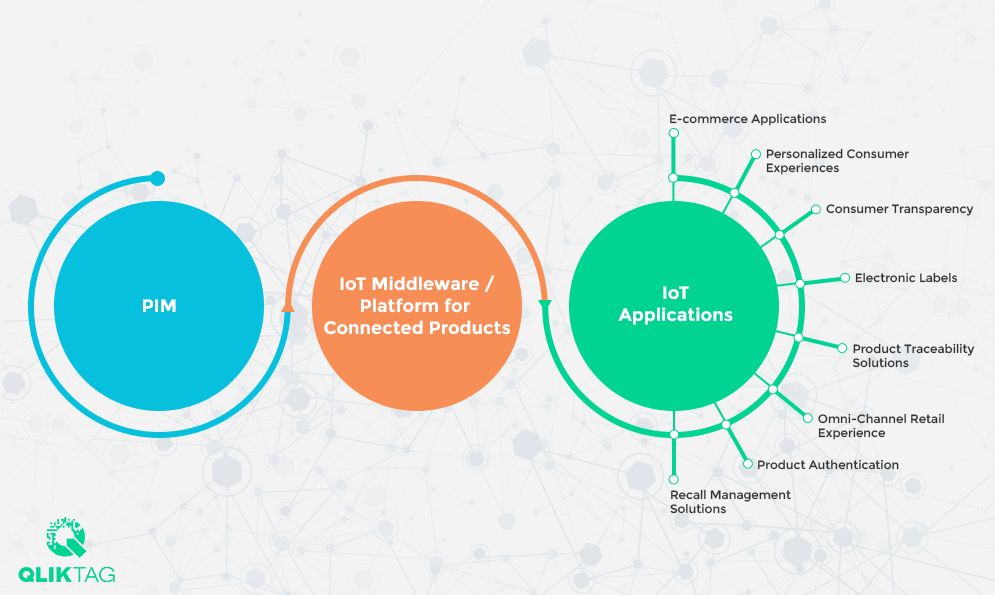With the right IOT Cloud Platform / Middleware
Every organization knows the value of product information management systems in order to manage and track their product data for optimum product lifecycle management. But is that enough? With IoT in Retail gaining traction and more and more enterprises looking to digitally transform their supply chain operations, it is time to look beyond the traditional PIM functions and applications.
Current PIM systems exist largely for internal use within the enterprise, available to employees with varying degrees of access privileges and interactions. They help in storing and retrieving product information and attributes of every item within an organization’s product catalog. PIMs contain heaps of valuable data, which when provided context, can transform it into a powerful tool for enterprises to elevate their businesses.
While, PIM systems are inward facing systems to power internal applications, in order to become outward facing systems that can serve attributes to external systems and applications, there are a host of features and changes required. By connecting PIMs to the cloud through powerful middleware IoT platforms like the Qliktag IoT Connected Smart Products Platform, brands can pull data from their PIM systems and feed external internet applications and systems securely in the required formats that drive IoT systems and internet applications online.
The question that brands need to be asking right now is how can they further leverage the data existing within their internal PIM systems to power external applications to improve supply chain efficiency, provide consumer transparency, deploy electronic labels, traceability data, improve consumer experiences and more. They need to realize that the product information that employees have access to is equally valuable to customers if not more so. The purpose of IoT connected products or smart packaging solutions is to convert real time data into actual business value. With a large repository of data already sitting in their PIMs, combined with a cloud platform and appropriate middleware to expose it to customers via secure APIs, customer-facing data can have a wide range of valuable applications.
Reinforce Consumer Transparency
The data in PIM in combination with an IoT cloud platform can elevate everyday consumer products into smart connected products with digital twins capable of telling their own story. Digital twins for each product on batch and SKU level can be used to feed electronic product labels like SmartLabels that can be activated on the packaging via a smartphone or any other scanning device. Brands can not only offer complete and accurate information like provenance, expiry dates, ingredients and allergen lists etc. to customers, but also create easy-to-read, attractive and interactive interfaces to do so while leveraging a familiar and ubiquitous technology platform.
Enable Traceability
The ability to read and write data back to a digital twin when the physical product moves from one point in the supply chain to the next means customers will be able to track and trace the entire journey the product they are contemplating on buying has taken from its source to the shelf.
Enable POS interactions
Personalization is the trend that will dictate competition in the retail industry in the coming years. Personalized and curated content like promo codes, discounts, offers and loyalty programs become easier to implement with smart connected products on the shelf which are autonomously communicating with their digital twins. Collating and organizing information for a vast number of consumer items according to individual customer preferences involves the generation of a large amount of data, something which becomes possible with a database based on a cloud platform connected.
Drive omni-channel retail experience
Data is at the heart of superior customer experiences across multiple channels. What separates e-retail from brick and mortar stores is the extent of the personalized features and experiences offered by the former, which become possible due to their ability to collect and store a large amount of data at every stage of the customer’s journey from point of consideration to an actual sale.
Brick and mortar stores can gain an equal footing through IoT Cloud / PIM hybrid applications to implement omni-channel retail experiences in order to provide a seamless, integrated and consistent experience to customers. By converting product information sitting in their repositories into meaningful stories, thus creating context, they can deliver rich, meaningful and insightful experiences through digital product labels.
Every enterprise needs to keep an eye on technology trends giving direction to their respective industries. They cannot stop at simpler and leaner supply chain operations, but innovate to future-proof their businesses in order to maintain a competitive edge. IoT enabled smart packaging and smart connected products are the future of retail with data being its core. Enterprises can leverage their existing PIMs by reining in this power of data and giving context to the product information stored in their respective PIM solutions. By exposing product data to customers, previously only available to employees, through IoT middleware and smart packaging to enable multiple IoT applications that deliver intelligent and delightful customer experiences, enterprises will have ensured their place in the future of retail.

Recent Comments